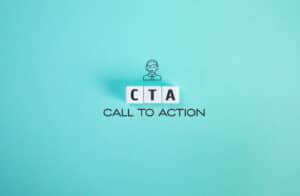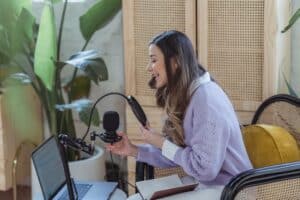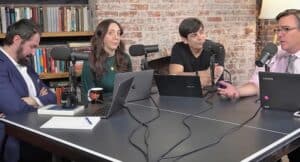Are you looking for podcast intro music? Wondering what are the best places to find royalty-free music to start your show with?
Licensing songs for podcast intro music is a complex topic that relies on a range of factors. But podcasts that include musical elements are often more engaging. Starting off an episode with intro music and using songs to move a story forward contributes to a professional sounding podcast.
Jordan Kisner writes, “…a podcast producer has only music and sound design to offset the storytelling voice without obscuring it or drowning it out.” Using music in a podcast intro is a crucial way to initially grab an audience’s attention and provide more depth to a story. However, the intricacies of correctly licensing podcast music is a hotly debated topic between podcasters.
In this article, we’re providing “risk averse” podcast music options to minimize your chances of future disputes. There are exceptions to information provided, but these tips are the rules of thumb you should keep in mind when finding music for your podcast episodes. Although this information is based on the opinions from professional music industry lawyers, copyright law varies from country to country so this article shouldn’t be taken as legal advice.
Let’s start with answering the biggest question podcasters have when it comes to podcast music.
Why You Shouldn’t Use Commercial Music In Your Podcast
It’s important to understand that a musical recording has at least two types of copyrights: the Publishing Rights related to the song itself and the Master Rights related to a specific recording of that song.
When Dolly Parton wrote “I Will Always Love You”, even before she recorded the song, it was automatically copyrighted when she wrote down the lyrics and the guitar chords. When Parton recorded the song, whoever paid for the recording took ownership of the Master Rights of that specific recorded version.
Dolly Parton owns the Publishing Rights to Whitney Houston’s version of “I Will Always Love You” because Parton composed the original song. But whoever paid for Houston’s recording owns the Master Rights to that specific recorded version.
As a podcast creator you need to secure the necessary permissions from all rights-holders. That means licenses for the song and the recording (that’s two licenses), for worldwide use (because your podcast is likely to be available globally), and forever (because once you publish your podcast, you likely want it to be available in perpetuity).
So when you “copy” a music recording into your podcast, you need to have the permission of whoever owns the Publishing Rights and the Master Rights.
It may be unlikely that you’ll receive permission to use a commercial song in your podcast in all territories and for the life of the podcast (forever). This is partly because a song will be owned by different entities in different parts of the world. So, you would have to get permission from company “A” in the United States, company “B” in the United Kingdom, and company “C” for Outer Mongolia, etc. to legally use a copyrighted song.
And these companies might not give you a license that lasts forever because your podcast could become a massive hit in future. When that happens, they’ll want to charge you more money for using their music!
You may have heard commercial, copyrighted music in podcasts before. Why is that?
I’ve Heard Copyrighted Music In Podcasts. Why Can They Do It, But Not Me?
If you’ve heard copyrighted music in podcasts, it’s probably due to one of the following reasons:
- The podcast is created by a broadcasting organization who pays large sums of money for the right to use commercial music. For example, BBC pays the UK’s Performing Rights Society for the right to broadcast commercial music on TV and radio. As part of this deal, they may also be able to include commercial music on podcasts they produce.
- There are rules that allow a particular percentage of a commercial track to be played for review purposes but caveats may apply and this almost certainly varies between territories – so what may be allowed in the US may not be allowed in the UK for example. In this case the podcast should be geo-blocked or, there is likely to be a breach in copyright law.
- The podcast may be illegally using the music.
What Types Of Podcast Music Are Allowed?
We know what you’re thinking, What music am I allowed to use for my podcast intro? There are four main ways to legally use music within your episodes, each with their own unique restrictions.
Royalty-free music
Time for some good news! Royalty-free music, also known as production, stock or library music, is specifically made for use in podcasts and other content mediums. Companies offer a broad range of tracks in different styles and all stock music is immediately available to use.
You can usually use the music worldwide and in-perpetuity but it will be a non-exclusive licence. This means other people can license the same music as you.
But not all royalty-free podcast music is licensed the same way. Some music libraries charge one-time fees to use a song as many times as you’d like. Others charge “per usage”. This means you purchase a license for every specific application of the song. For example, you license Song A as your podcast intro music on a per usage basis. This means you pay a licensing fee every time you release a new episode that features Song A in your intro. For one-off songs, per usage licenses aren’t an issue but for music you use repeatedly, it can become costly very quickly.
In recent years, some libraries have started to offer a subscription model, meaning that you pay a monthly or annual fee to use as much music as you need. This essentially negates the issue of having to pay for each individual use of the music and is a really good option if you make a lot of content and use podcast music often.
Public domain music
You’ll often see people suggest “Out Of Copyright” or “Public Domain” music as a free option for your podcast but this option could still land you in hot water! While it is true that copyrights can expire, there are complications to using it for free legally. You can’t assume that because the composer died over 70 years ago, you can automatically use their music. The complications are:
- The rules about when the copyright expires varies from country to country. So for example, although you may legally be allowed to use a recording in the public domain in the UK, the work may remain under copyright in the US. As your podcast is likely available in both territories, you would be infringing copyright law in one or more territories.
- Copyright in the recording and copyright in the composition may expire at different times.
- To legally use an out-of-copyright recording, it may be necessary to access the original gramophone recording! This is because new, re-mastered digital versions of the recording may be deemed to have a new copyright that has not expired.
In short, do not assume you’re safe to use public domain music just because you’ve seen it on a list of “Out-Of-Copyright songs” somewhere online. If your podcast is available worldwide, we’d suggest seeking legal advice to confirm the public domain recording is legal to use without a license. But in reality, if you’re trying to use free podcast music, you probably don’t want to pay a lawyer!
Moving on…
Creative Commons Music
Good news! With caution, some music covered by particular Creative Commons licenses are viable options for using free music in a podcast.
A few things to be aware of when using music under Creative Commons licenses:
- There are 6 types of Creative Commons licenses. Three are for commercial use and three are for non-commercial use. What amounts to “commercial use” is not specifically defined within the terms so it would be safer to interpret this widely. For example, although you may not charge anything for your podcast, you may in future intend to indirectly benefit commercially like selling merchandise.So it’s safest to assume you need a commercial CC license.
- It’s vital that you comply with all the terms and conditions of the license, otherwise the licensor (music owner) can terminate the license at any time. For example, all commercial-use CC licenses require that you credit the licensor (owner of the music). It would be advisable to do this as audio, spoken at the end of your podcast as well as in text form in the show notes.
- The licensor (music owner) disclaims all liability for any losses suffered by the user from using the licensed material. This means that in the event that you were sued for using the music by an actual rights owner, because the licensor did not in fact have the right to grant you the license, in some territories, you may have no recourse against the licensor. Even though this is probably an unlikely scenario and not something to overly worry about, it’s worth being aware of.
So, if you are going to license podcast intro music under Creative Commons, make sure that it is a commercial-use license (unless you are sure that you will never produce your podcast for commercial gain); comply with all the terms and conditions of the license including attribution; and accept that there is an element of “buyer beware” when using copyrights under a CC license.
Licensed music you own the rights to
Whether you compose music yourself or commission a composer, custom recordings are suitable podcast music options because you control the terms of the licence. Another big advantage is the music is typically completely original and will not be used on any other podcast. By creating original music, you may be able to make it very specific to your podcast such as using lyrics to express the title or context of your show.
If you compose and record original music yourself, you automatically own and control all the rights. It is not legally necessary but you may want to register your music with the performing rights organisation in your area.
If you commission a composer to produce music for your podcast, here are some tips:
You can find a composer for your podcast music by:
- Posting a request in podcasting Facebook groups like Podcast Movement
- Research and contact a composer you’ve heard on another podcast.
- Approach a local music school or academy
- Search for composers on Soundcloud
Curious how popular podcasts from Gimlet or NPR create their theme music? Luke Gordon from Syncly sat down with Breakmaster Cylinder for a peek behind the curtain and tips on working with composers.
13 Services To Find Custom & Free Music For Your Podcast
Anything free is great, right? If you can find free music that you love and you are sure that you are (and always will be) legally covered worldwide to use the free music, go for it and save yourself some dollars!
For those who are able to pay a little extra for their podcast music, there are great reasons to support this choice:
- More choices: easily find a wide range of music from one trusted music library source
- Peace of mind: know that you’re legally covered and not at risk for infringement notices
- Exclusivity: In the case of paying a composer, know that the music is original to you and your podcast
To get you started, here are 13 services to find royalty-free and affordable customized podcast intro music:
Best Per Track Based Podcast Music Options
- Syncly Music: Podcast music library service with unique ability to easily customize tracks to suit your podcast.
- Audio Jungle: Royalty-free library with music and sound effects. Purchase single tracks or “music packs” based on a genre or mood.
- Premium Beat: Offers two flexible licensing options based on your needs. Pay for a license once and you can use the music forever, worldwide.
- Audio Network: Offers single-use licenses, their licenses are cleared for worldwide, multi-platform use. A great option for video podcasters.
Best Subscription Based Podcast Music Options
- Soundstripe: Royalty-free podcast music library with multiple licensing options.
- Musicbed: Paid music service with affordable subscription plans, single song licenses, and custom composed offerings.
- Audioblocks: A podcast music subscription service offering music, sound effects, and loop tracks. Option to tailor subscriptions to audio or video licenses to keep costs low.
- Artlist: Music and sound effect subscription packages, all licenses include lifetime and unlimited uses.
- Epidemic Sound: Primarily a subscription based music library of 30K+ songs and 60K+ sound effects that offers unlimited use in digital ads.
Best Free Podcast Music Options
- Silverman Sound Studios: Music offered by Shane Ivers under Creative Commons license and free to use in podcasts if attribution is provided–or pay a small fee and you will not have to give credit.
- Dig CCmixter: Community-based platform offering some music that is completely free to use under a Creative Commons license.
- Free Music Archive: Similar to Dig CCmixter, FMA provides music under various Creative Commons licenses–some (but not all) is free to use in commercial projects such as podcasts.
- Sound Bible: A range of useful sound effects under Creative Commons licenses.
Syncly Music
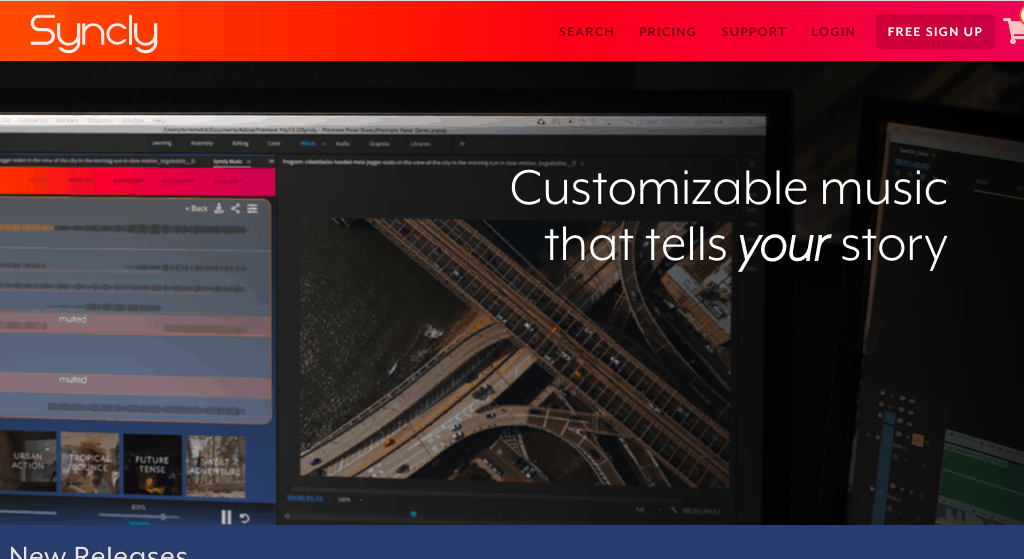
Syncly offers a wide-range of high-quality music from hugely talented, international composers. All the music in the library can be customized meaning you can adjust the speed of the track and even easily remove instruments to change the sound or mood to your liking. This also makes the track more unique to your podcast!
If you intend to use background music in your podcast, being able to adjust the track is useful to make it sound more subtle and fit the tone of the segment.
Syncly also offer all their tracks as stems (the individual instrumental layers) so if you work with a sound engineer, they can easily adjust the stems in their own digital-audio workstation such as Pro-Tools or Audition to create the perfect mix.
The catalogue features a collection of tracks composed specifically for podcast use by Breakmaster Cylinder and these have been tried and tested in some of the most popular podcasts the world has ever heard!
Music can be licensed on an annual subscription basis or bought one track at a time.
Audio Jungle
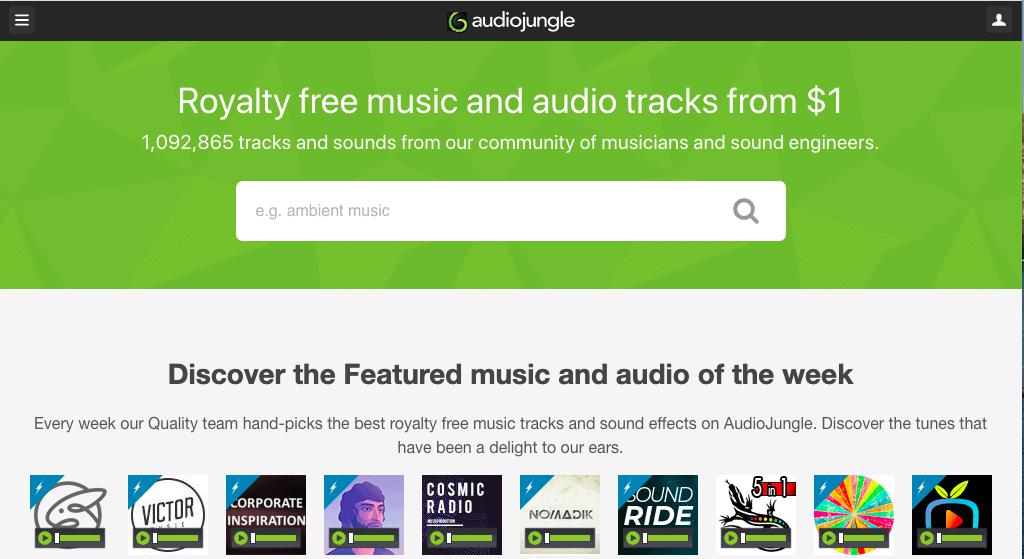
Audio Jungle has a large selection of tracks from a big community of composers. The music quality is reasonable and consistent making it easy to find “typical” styles but not so good for “interesting” or unusual tracks. The average price per track is on the low side but it will be worth checking directly with Audio Jungle that your license will cover your podcast.
Sound effects are also available and they have a subscription option for unlimited usage.
Premium Beat
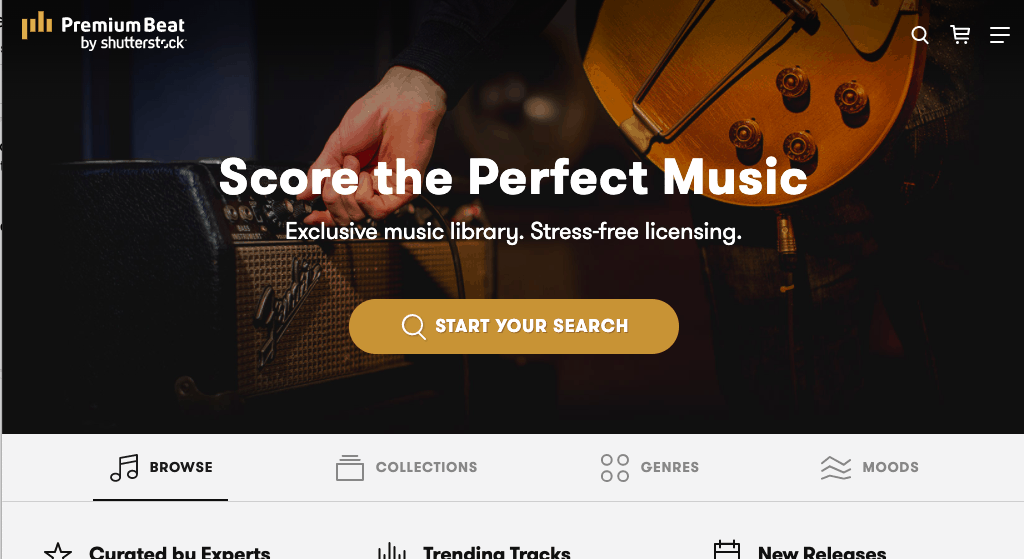
Premium Beat has a good selection of generally high-quality tracks. Like Audio Jungle, they lean towards corporate use so you may not find anything too far from the “typical” sound here. Their licensing is simple, offering just two options. At the time of writing, you can purchase a license to use one track in a podcast for $49 and this track can be used as many times as you like for no additional cost. They currently don’t offer sound effects or the option of a paid subscription.
Audio Network
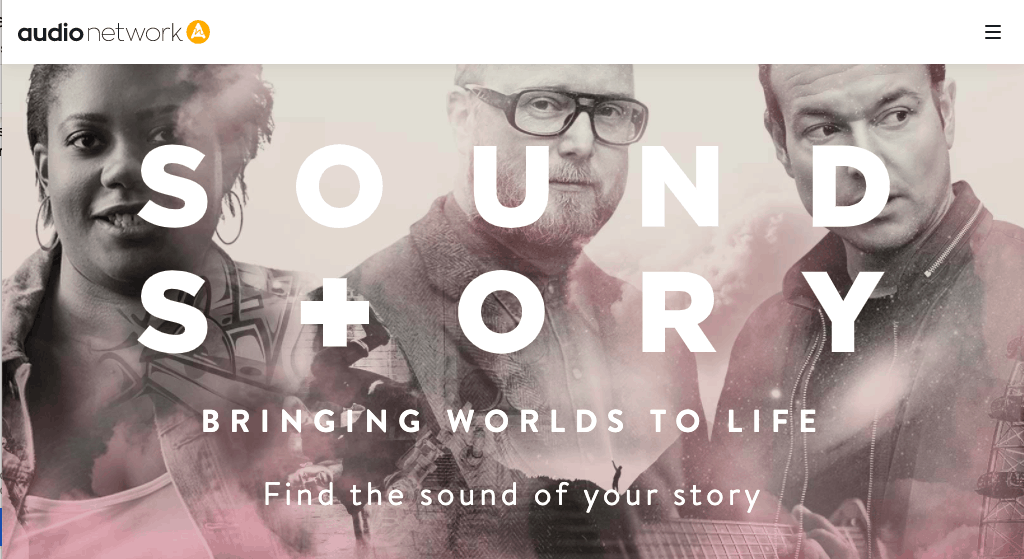
Audio Network has an excellent collection of music in many styles, from pop to orchestral scores. There is something here for everyone and with many licensing options to suit your production, although they only sell licenses on a per-track basis.
Soundstripe
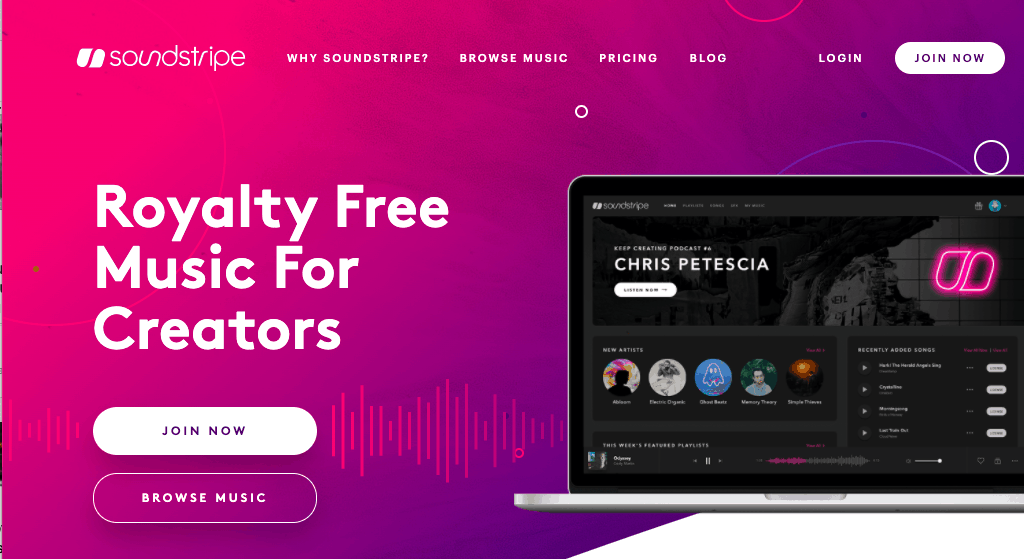
Soundstripe has a good selection of music that leans towards pop tracks (mainly electronic and folk) for marketing and corporate use. You have to subscribe to a paid monthly or annually subscription as they don’t offer the option to license one track at a time. Their medium and top-tier plans come with a collection of 35,000 sound effects.
Musicbed
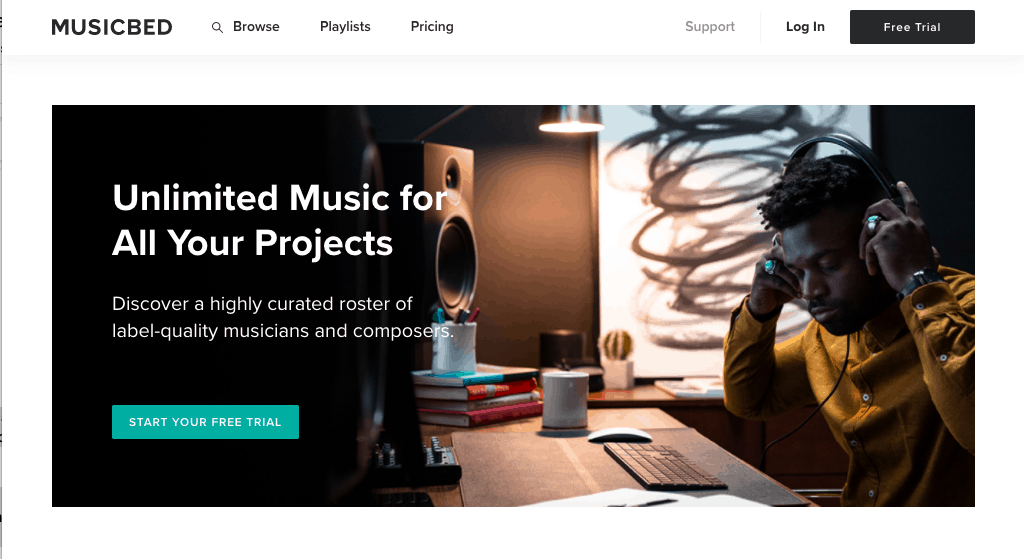
Musicbed has a premium selection of music from a roster of artists and composers, who often are signed to record labels. There are more pop oriented songs here than “score” material, but it’s all high quality.
They offer subscription plans, single song licenses, and custom music offerings all at different price ranges depending on the type of usage. To license a song for a podcast you must request a quote for an exact price.
Audioblocks
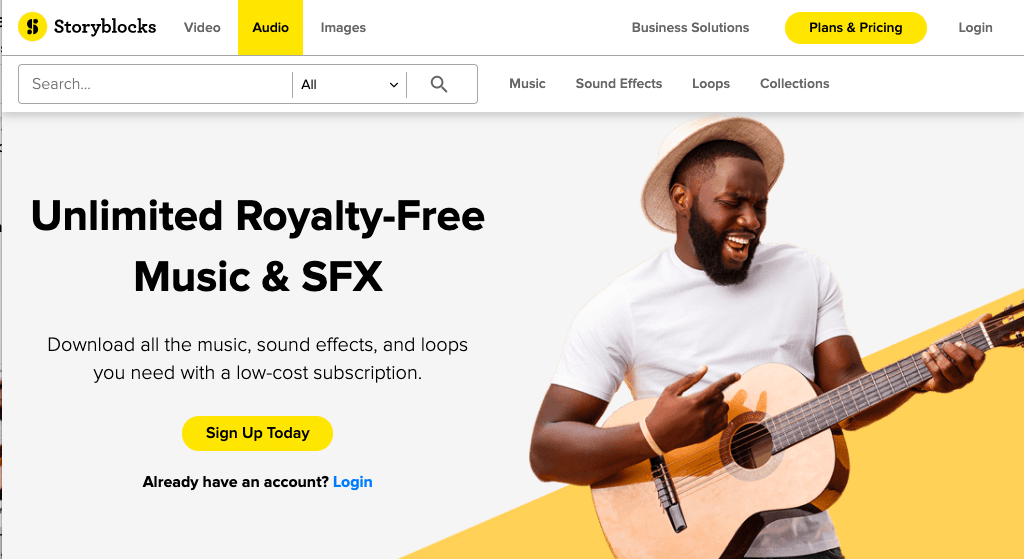
Audio Blocks only offer monthly or annual subscription options. Their mid-tier and top-tier plans include sound effects. Once again, the music is of good quality but leans towards a corporate sound.
Artlist
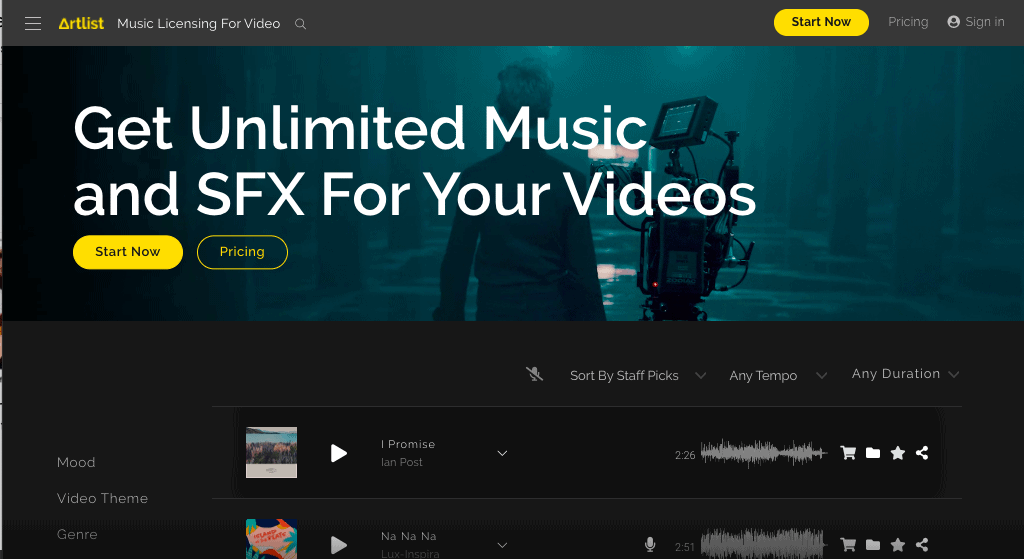
Artlist is a paid, subscription-only library with a range of music, mainly in a pop style, and a catalogue of sound effects at additional cost. They only offer one type of license that is intended for video use so it’s a great option for video podcasters. It is not entirely clear whether using music in a podcast is covered by this license and would be worth contacting the company directly to clarify this.
Epidemic Sound
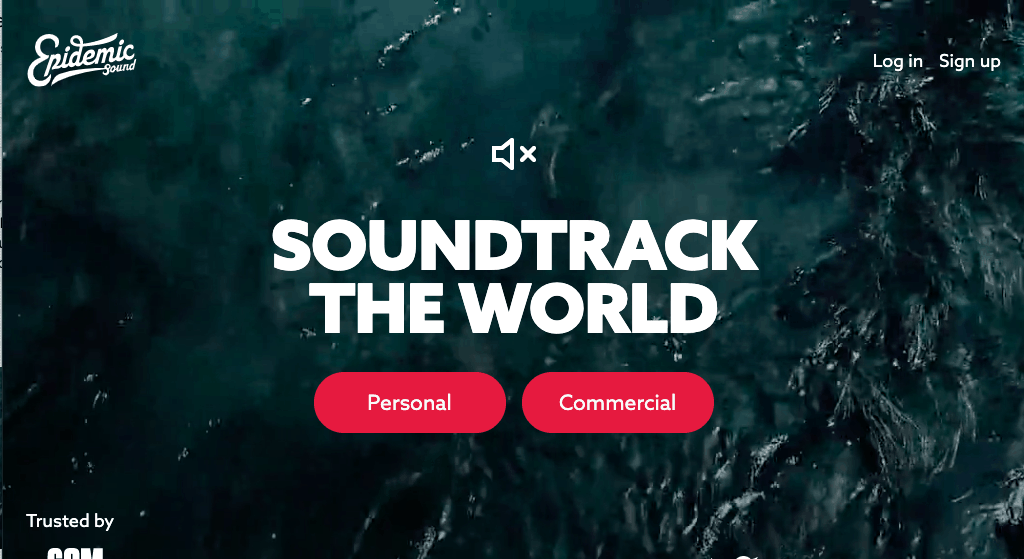
Epidemic Sound is another paid, subscription-only library with over 30,000 tracks to choose from. Sound effects and podcast usage are included in all plans.
Silverman Sound Studios
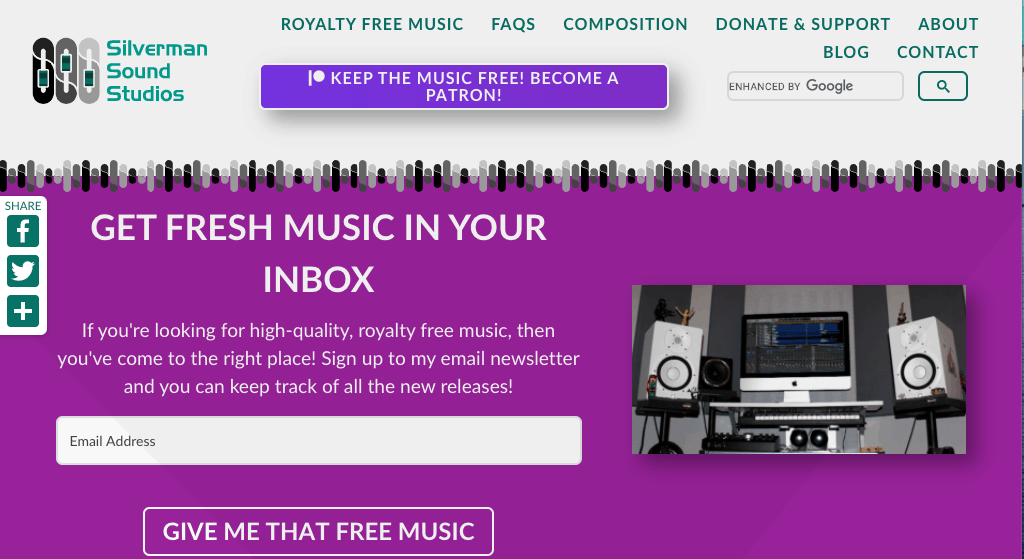
Silverman Sound Studios is a nice collection of tracks by one composer named Shane Ivers. He offers all his music for podcasts completely free under the Attribution-No Derivatives 4.0 International Creative Commons licence which means, as long as you give him credit on your podcast, the music can be used even in a commercial context (i.e. if you monetize your podcast). You can also opt to pay a small fee and forego the need to credit the composer.
The main drawback here is the lack of search tools so you’ll need to do a lot of listening to find what you need.
Dig CCmixter
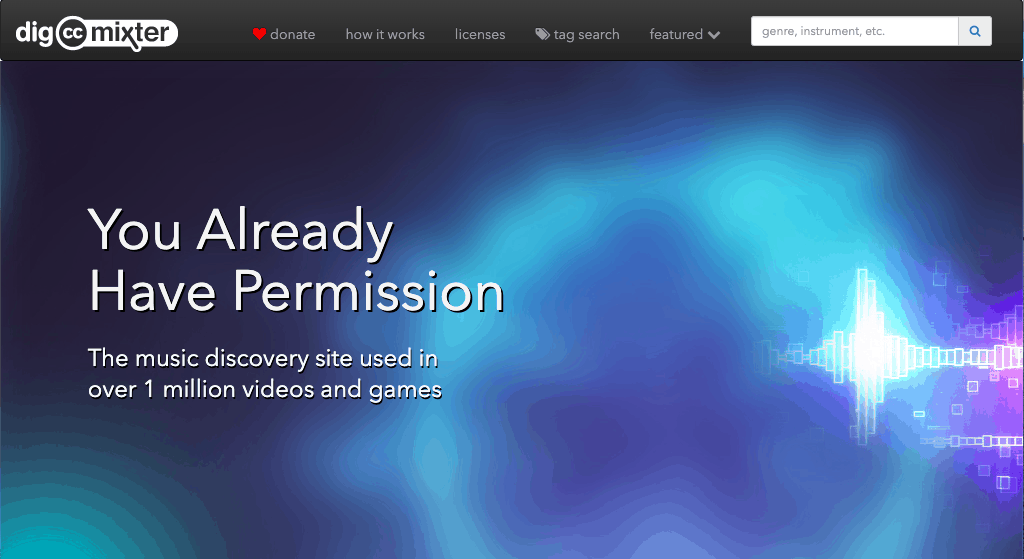
With Dig CCmixter, you can find some music that is completely free to use under a Creative Commons license. Remember that you always have to give credit to the composer/artist of the track and that some CC licenses are only valid for non-commercial projects (podcasts). This can be a good option for free music but the search engine is not very friendly so it may take a bit more effort to find the song you need compared with some of the more sophisticated websites that come with the paid-licensing music libraries.
Free Music Archive
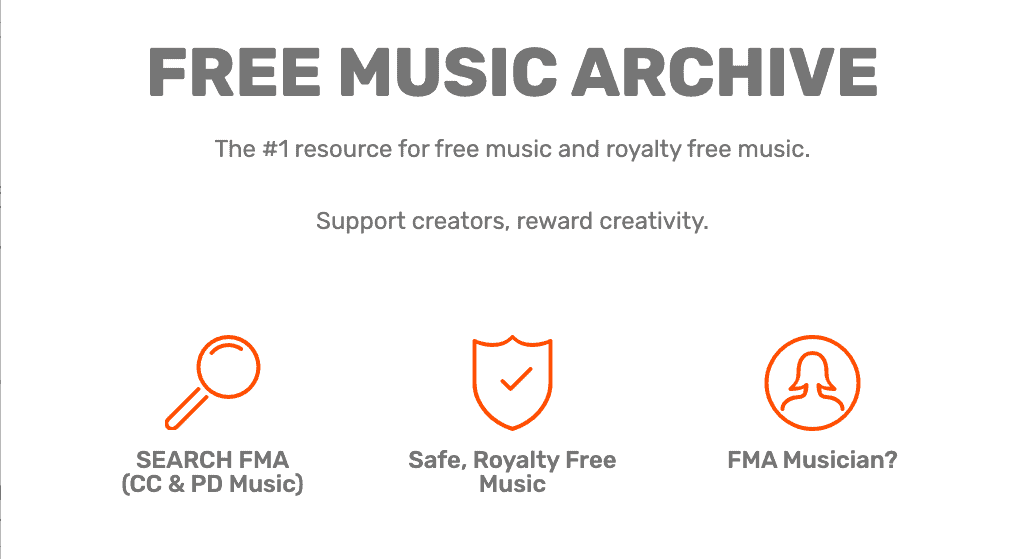
Similar to Dig CCmixter, Free Music Archive provides music under various Creative Commons licenses. Don’t assume that all tracks on the site are free to use in a podcast – they are not! You’ll also find that the quality of music is rather mixed compared with the curated paid music libraries. There’s some very good and quite interesting songs along with some dodgy stuff! But beauty is in the ear of the beholder, so who am I to say!
Sound Bible
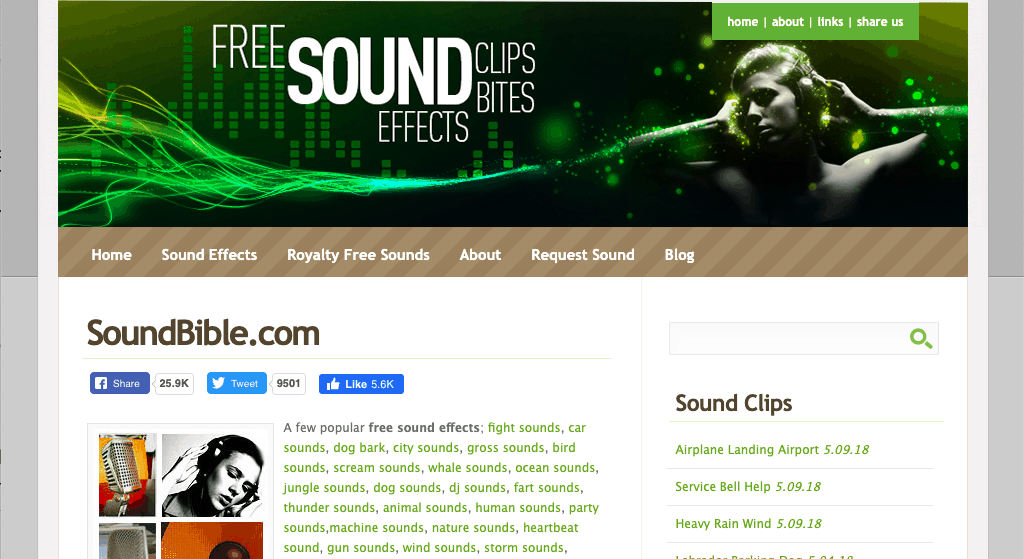
Being avid storytellers, having access to a catalogue of SFX to support your narrative is always going to be handy. Sound Bible is a free option gives you access to a range of the most common sound effects under a Creative Commons license.
How To Use Music To Improve Your Podcast
Music can be used not only in the intro and outro, but also in the body of your podcast. Adding melodies and background music can help tell your story by setting the mood or define episode segments.
However, it’s easy to go overboard. Pitchfork writes, “[the] worst thing music can do in a podcast is call attention to itself, or to compete with the voices over it.” They write, “at its best, [podcast music] amplifies not only what’s being said but the act of saying it.”
With so many use cases and nuances, here’s a list of four key ways music can improve your podcast without taking over.
Set the mood of a scene or segment of the show
As filmmakers and radio producers know, music is a powerful tool for expressing your story. As podcast producer, Brendan Baker, suggests, “if you take a piece of music that already has a set of subconscious imagery in it, and match that to a story with particular descriptions…–then something really cool happens and the image solidifies.”
Define sections or chapters of the show
Reply All features music by The Mysterious Breakmaster Cylinder. They have an intro and outro theme, plus different tunes for regular segments of the show. Using theme music for consistent segments helps to build a show’s structure and clue your audience into the next portion of the episode.
Manipulate time
Sometimes it’s useful to use music as a device to play with the listener’s perception of time. By adding music with a pace or subtle emotions, the accompanying narrative will maintain the listener’s attention and interest in your story.
The opposite of propelling the story forward with music is to create tension and suspense; to literally suspend time. You can probably imagine the classic 1950’s thriller music of tremolo strings but there are many more subtle ways to do this, and it doesn’t have to sound overtly scary!
It’s easy to experiment with this but you don’t have to start from scratch. To play with momentum, here’s a track with a light, scientific feel from Syncly to test how customizing the track can help move your narratives forward and fit perfectly in your sound mix. Simply adjust the “Customize” slider to experiment.
Draw attention to a key point in the story or dialogue
A change in music can signify an important moment in your narrative. This can be as simple as stopping the music in an obvious way if music was previously playing. Or an abrupt start of music will suddenly grab the listener’s attention and signal an upcoming story arc.
Common Podcast Music Questions, Answered
There is a lot of misinformation available about podcast music so let’s answer some of the most commonly asked questions.
When considering how to use music in your podcast it’s important to understand that:
- Podcasts are distributed worldwide so you must be legally covered to use the music globally – not only in the country where you created the podcast.
- You need permission from all copyright owners for the “Master Recording” and the “Publishing Rights”. This is explained more fully later on unders A Brief Introduction To Music Copyright.
Let’s first look at some of the myths you may have heard about using music in your podcast without having to pay or get permission:
Is it OK if I only use a few seconds of a copyrighted song?
Unfortunately not. It is indeed a myth that a small amount of music is allowable so you must seek permission and gain the appropriate license to use any amount of music in your podcast–even one second. This also generally applies to sound effects and any other audio you use that has been created by someone else such as a quote or sound-grab.
Can I sample commercial music as long as it’s not in my podcast intro or outro?
No. A permission must be obtained for all music used no matter where it appears in your podcast.
If my podcast is about reviewing songs or artists, can I use their music?
Getting permission to use commercial music is complicated (see above for more information on the types of copyrights) but you will still need to do so in a review scenario. In some countries, you may be able to claim “fair-use” to review music in a podcast but there is a big issue with this approach. Fair-use exceptions to copyright law are specific to particular territories but your podcast is very likely to be available in countries where that fair-use exception does not apply.
The only way to be sure that you are legally allowed to play and review commercial music in your podcast is to get written permission for the worldwide right to play the tracks from all copyright holders. This would be a manual process and be likely to involve many different stakeholders
My podcast has a small following and I don’t make any money from it. Can I use commercial music?
Copyright law applies regardless of whether or not you make money from your podcast.
What happens if I receive a copyright infringement notice?
It depends on many things but possible outcomes are that your podcast is taken out of service or that you’re sued for damages. At the time of writing, Universal Music Group is suing iBusMedia media company for several million dollars for alleged copyright infringement.
In short, it’s not worth the risk of infringing copyright law. Say you have a small podcast audience now and think the chances of getting caught are slim. Then your following grows and suddenly you’re exposed to large infringement penalties to ruin your success in one fell swoop.
Also, there are more tools available that can automatically identify illegal music use within a podcast, similar to YouTube’s Content ID system. This will make it more difficult in the future to “get away with” using music without permission.
Finally, to say that you didn’t know you needed a license or that you could not find the copyright owners is very unlikely to be accepted as a defense if legal proceedings are taken against you.
My podcast represents a not-for-profit organization. Do we need permission to use music in our podcast even if we’re a charity?
Nonprofits are not exempt from copyright law and must obtain the necessary permission to use music legally. However, paid music services often give special discounted rates for charity content.
Do I have to pay royalties to play music on my podcast?
Royalties are payments made to the music owners for the use of their works over a period of time. Although royalty payments still apply to music used within podcasts, it will be the distribution service, such as Spotify or Apple that pays these royalties rather than you, the podcast producer.
So, as long as you have secured the permission to use the music in your podcast, you will not have to pay on-going “performance” royalties after this.
Legal Tips To Remember For Podcast Intro Music
Music for podcasts can come from a range of suppliers, in different moods and styles, under a wide range of terms and at varying costs from free to astronomically expensive.
Here is a list of the key legal factors to consider when choosing and gaining permission to use music legally in your podcast:
- Get permission in writing–usually in the form of a license agreement.
- Make sure that permission covers the Song (publishing) and the Master (the specific recording of the song you are using). If you are paying for music from a stock music library, these rights are always bundled together to make things easy.
- Due to the nature of podcast distribution, you will need permission to use the song worldwide, in perpetuity. If you are paying for music from a stock music library, this is usually the case but it is always worth double checking.
- Make sure that the license covers the music (Song and Master) specifically for use in a podcast.
- Understand whether the license allows the music to be used once or multiple times. I.e. for podcast intro music, do you need to purchase a new license for each new episode you make? This is an important distinction that varies between music providers.
- If you are using music under a Creative Commons license (or any license for that matter), be sure to adhere to the terms and conditions such as providing a credit to the composer.
- If you are dealing with a freelance composer or a local band, make sure that they own all the rights to the Song and the Master. If there are multiple songwriters for example, you will need to get signed permission from all of them. Keep in mind that copyright can be so complicated that not even the songwriters know who owns the rights! If the composer or band have a publishing or recording deal, it’s unlikely that they fully own their rights and therefore won’t be authorized to give you permission to use their song.
Summary
Using intro music is a great way to bring your podcast to life and grab the attention of your listeners. Music can help tell a better story and help build your brand. There is an abundance of music suppliers but many are not suitable for podcasting due to the nature of its worldwide distribution.
If you have no budget there are plenty of free songs available under Creative Commons. Just make sure you understand the license and be prepared to take some time on the clunky websites these tracks are typically available on.
If you have a small budget, there is a huge selection of music available for podcasts on many stock music sites. The licensing is usually easy to understand and the websites make it easy to filter down to the song you want.
With a larger budget, nothing beats hiring a composer to create a bespoke theme song for your podcast. This ensures a unique and exclusive sound under the terms you need.
Whichever option you choose, make sure you are legally covered with written permission that covers your podcast worldwide, in perpetuity.
Written by Luke Gordon. By the age of 17, Luke was making tea in some of the finest recording studios of London. After much knob-twiddling he found himself in front of the controls for the likes of Goldfrapp, The Cure, Pulp, Marc Almond and Stereophonics. Luke moved on to produce his own music, focusing on scoring for documentaries broadcast around the world on BBC and National Geographic as well as TV commercials for brands such as Coca-Cola, Mini Cooper and Tissot.
In 2019, Luke established Syncly Music which brings together a very international bunch of composers under one website and provides a one-stop-licensing-shop for anyone in need of music for podcasts or video.
